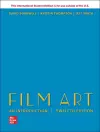
ISE Film Art: An Introduction
3 authors - Paperback
£59.99
David Bordwell is Jacques Ledoux Professor Emeritus of Film Studies in the Department of Communication Arts at the University of Wisconsin–Madison. He also holds a Hilldale Professorship in the Humanities and an Honorary Doctorate from the University of Copenhagen. He has also held the Kluge Chair in Modern Culture at the Library of Congress. His books include Narration in the Fiction Film (University of Wisconsin Press, 1985), On the History of Film Style (Harvard University Press, 1997), Planet Hong Kong: Popular Cinema and the Art of Entertainment (Harvard University Press, 2000; 2nd ed., Irvington Way Institute Press, 2011), Figures Traced in Light: On Cinematic Staging (University of California Press, 2005), The Way Hollywood Tells It: Story and Style in Modern Movies (University of California Press, 2006), The Rhapsodes: How 1940s Critics Changed American Film Culture (University of Chicago Press, 2016), and Reinventing Hollywood: How 1940s Filmmakers Changed Movie Storytelling (University of Chicago Press, 2017). He has also written books on Carl Theodor Dreyer, Yasujiro Ozu, Sergei Eisenstein, digital cinema, and Hong Kong film. Kristin Thompson is an Honorary Fellow in the Department of Communication Arts at the University of Wisconsin—Madison, where she earned her Ph.D. Her books include Eisenstein’s Ivan the Terrible (1981), Exporting Entertainment: America’s Place in World Film Markets 1901–1934 (1985), Breaking the Glass Armor: Neoformalist Film Analysis (1988), Storytelling in the New Hollywood: Understanding Classical Narrative Technique (1999), Herr Lubitsch Goes to Hollywood: German and American Film after World War I (2005), and The Frodo Franchise: The Lord of the Rings and Modern Hollywood (2007). Jeff Smith is a Professor of Film Studies in the Department of Communication Arts at the University of Wisconsin—Madison, where he earned his Ph.D. He is the author of two books: The Sounds of Commerce: Marketing Popular Film Music (1998) and Film Criticism, the Cold War, and the Blacklist: Reading the Hollywood Reds (2014). He has also published several articles and book chapters on the role of sound and music in American cinema. He is currently at work on a book that traces development of the classical Hollywood film score during the 1930s that examines how studios allocated musical resources to films based on their position within the hierarchy of prestige pictures, programmers, and “B” films.